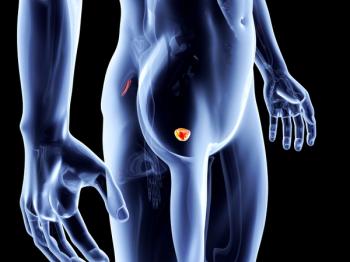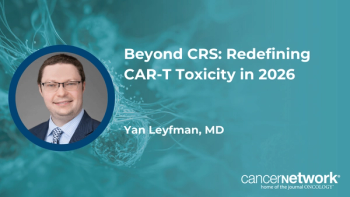
Recap: Utility of ctDNA to Manage Adjuvant Therapy in CRC
Stacy A. Cohen, MD, and Mark Lewis, MD, review results from the GALAXY study on circulating tumor DNA dynamics in CRC.
When Mark A. Lewis, MD, narrowed his practice to focus on the treatment of patients with gastrointestinal malignancies, use of blood-based sampling to inform treatment strategies was eliminated from his repertoire.
“I used to have a practice that included hematology, and I’ve missed MRD
[molecular residual disease] assays because I was using them only in the liquid setting. I haven’t had them in solid tumors,” said Lewis, who is director of gastrointestinal oncology at Intermountain Healthcare in Murray, Utah.
That may soon change, however, thanks to advances in the measurement of MRD by way of circulating tumor DNA (ctDNA) in colorectal cancer (CRC).
Lewis hosted a recent edition of a CancerNetwork® Between the Lines program with Stacey A. Cohen, MD, assistant professor in the Division of Oncology at the University of Washington and an associate professor in clinical research at Fred Hutch Cancer Center in Seattle, in which they discussed the potential of ctDNA as a treatment-guiding biomarker for patients with resectable CRC.
Probing the Potential of ctDNA
The conversation centered on the results of the observational GALAXY study, in which patients with CRC underwent postsurgical ctDNA testing at key treatment intervals, using the Signatera bespoke multiplex-PCR NGS assay, to stratify postsurgical treatment decisions.1
GALAXY is 1 of 3 clinical trials in the CIRCULATE-Japan series.2 Another in the series, the phase 3 VEGA study, is comparing postoperative surgery alone with standard capecitabine plus oxaliplatin adjuvant therapy for patients with high-risk stage II or low-risk stage III colon cancer who have negative ctDNA 4 weeks after curative surgery in GALAXY. Lastly, the phase 3 ALTAIR trial is examining how trifluridine/tipiracil (Lonsurf) compares with placebo in patients with resected CRC who are ctDNA positive in GALAXY.
Lewis noted that the CIRCULATE trials follow earlier research into ctDNA, including a 2016 study of patients with stage II colon cancer; those results showed that postsurgical ctDNA negativity conferred a low risk of relapse.3
Similarly, results of a 2019 study of patients with stage I to III CRC found that patients who were ctDNA positive 30 days following surgery were 7 times more likely to relapse than those with negative ctDNA. The HR of 7.2 was “very compelling,” said Lewis (95% CI, 2.7-19.0; P <.001).4
GALAXY Design and Results
Data from the GALAXY study were presented at the 2022 Gastrointestinal Cancers Symposium.1 The trial enrolled more than 1500 patients with stage II to IV resectable CRC. At 4 weeks post surgery, 188 patients were ctDNA positive and 852 were ctDNA negative. Cohen noted that the final outcome cohort consisted of 1040 patients, following a number of significant exclusions.
“Patients who went on interventional trials that might conflict with the study were excluded. [So were] those with pathologic complete response, [who] you might expect to have very good outcomes,” Cohen said.
Cohen added that the study did not mandate a specific type of neoadjuvant therapy, which she said will affect the results. “We all know that the benefit…in someone who had neoadjuvant therapy is very different than in someone [whose treatment began] with surgery,” she said.
Results indicated that ctDNA status made a significant difference in disease-free survival (DFS) outcomes among study participants. Altogether, 96.5% of patients (95% CI, 95.0%-97.5%) who were ctDNA negative at 4 weeks post surgery achieved DFS at 6 months, compared with just 62.8% (95% CI, 55.4%-69.2%) of patients who were ctDNA positive at that time. At 12 months out from surgery, the DFS rates were 92.7% (95% CI, 90.4%-94.5%) and 47.5% (95% CI, 39.3%-55.2%), respectively, for those patients with ctDNA negativity and positivity. Similar findings were noted when data were limited to patients with pathologic stage II and III disease.
Gauging Impact of ctDNA Changes
GALAXY also included a dynamic analysis of 838 patients who were assessed for ctDNA at both 4 weeks and 12 weeks. In that cohort, patients who were positive at the first assessment and negative at the second served as the reference group, with all 62 patients experiencing DFS at the 6-month timepoint. In total, 660 patients were ctDNA negative at both time points, with 98.0% achieving DFS at 6 months (HR, 0.60; 95% CI, 0.27-2.15; P = .60). Among patients who were ctDNA positive (n = 84) at both time points, only 58.3% were disease free at 6 months (HR, 15.8; 95% CI, 5.7-44.2; P <.001). Finally, patients who were ctDNA negative at 4 weeks but positive at 12 weeks had a 6-month DFS rate of 62.5% (HR, 9.2; 95% CI, 3.0-28.4; P <.001).
The study data also showed that patients with positive ctDNA 4 weeks post surgery, also known as the clearance cohort, tended to benefit from adjuvant chemotherapy. Among patients with pathologic stage III cancers, the 6-month DFS rate was 89.2% (95% CI, 78.7%-94.7%) for those who underwent adjuvant chemotherapy vs just 32.0% (95% CI, 15.2%-50.2%) for those who did not.
Lewis said he was also struck by the fact that 25 patients with stage III disease were not given adjuvant chemotherapy. Such treatment, he noted, is the clear standard of care for such patients, so “likely, some confounding variables explain why those patients weren’t receiving adjuvant chemotherapy,” he said.
Finally, the trial showed that more than two-thirds of patients (68%) who were ctDNA positive at 4 weeks post surgery and had adjuvant chemotherapy were cleared (ie, ctDNA negative) at the 6-month timepoint, compared with only a 10% clearance rate among patients who did not undergo adjuvant chemotherapy.
Looking Ahead to ctDNA’s Potential
It isn’t yet clear what role ctDNA will ultimately play in postsurgical care of patients with CRC, Cohen said, in part because the existing evidence is conflicting. For instance, she described a recent study comparing surveillance using ctDNA with standard carcinoembryonic antigen (CEA) assessment, and “ctDNA was not the winner,” noted Cohen.5 “There [are] still data to say CEA and imaging [are] the best way to do surveillance.”
However, Cohen pointed out that on an individual-patient level, sometimes ctDNA won out. The difference may come down to when testing is done.
Lewis said there’s reason to be optimistic that ctDNA could outperform traditional histopathological risk-stratifying factors, but that he is not convinced that the science is there yet. He posited a scenario in which a patient with stage III disease has a negative ctDNA reading 4 weeks post surgery. “Are we convinced that it’s safe to not give him chemotherapy? That’s where we’re going to need some of these coming trials to answer that question in a randomized fashion.”
Lewis said that the other 2 CIRCULATE-JAPAN trials, VEGA and ALTAIR, will be important in validating ctDNA testing, and he noted that COBRA (NCT04068103) will look at ctDNA as a predictive biomarker in patients with stage IIA colon cancer. CIRCULATE-US (NCT04089631), meanwhile, will look at patients with stage II CRC who have undergone resection to compare DFS by postsurgical treatment strategies, including adjuvant chemotherapy and follow-up alone.
And another upcoming trial, Stand Up to Cancer ACT-3, will attempt to use ctDNA data to match patients with the best therapy.
Practice Implications
While those study results will not read out for some time, Lewis said he can already envision how ctDNA could be helpful in the practice setting. It might assist patients in decision making when they are unsure about proceeding with adjuvant chemotherapy, for example.
“If you have someone whose [ctDNA test results] go from positive to negative, it is a way of demonstrating to them in real time that the chemotherapy is working,” Lewis said.
Cohen added that the considerable skepticism about ctDNA shouldn’t overshadow its potential benefits, if the technology is further refined and validated. “This is an incredible technology,” she said, noting that clinical trial research will “help everyone understand what role this can have in modern oncology.”
References
- Kotaka M, Shirasu H, Watanabe J, et al. Association of circulating tumor DNA dynamics with clinical outcomes in the adjuvant setting for patients with colorectal cancer from an observational GALAXY study in CIRCULATE-Japan. J Clin Oncol. 2022;40(suppl 4):abstr 9. doi:10.1200/JCO.2022.40.4_suppl.009
- Taniguchi H, Nakamura Y, Kotani D, et al. CIRCULATE-Japan: circulating tumor DNA-guided adaptive platform trials to refine adjuvant therapy for colorectal cancer. Cancer Sci. 2021;112(7):2915-2920. doi:10.1111/cas.14926
- Tie J, Wang Y, Tomasetti C, et al. Circulating tumor DNA analysis detects minimal residual disease and predicts recurrence in patients with stage II colon cancer. Sci Transl Med. 2016;8(346):346ra92. doi:10.1126/scitranslmed.aaf6219
- Reinert T, Henriksen TV, Christensen E, et al. Analysis of plasma cell-free DNA by ultradeep sequencing in patients with stages I to III colorectal cancer. JAMA Oncol. 2019;5(8):1124-1131. doi:10.1001/jamaoncol.2019.0528
- Fakih M, Sandhu J, Wang C, et al. Evaluation of comparative surveillance strategies of circulating tumor DNA, imaging, and carcinoembryonic antigen levels in patients with resected colorectal cancer. JAMA Netw Open. 2022;5(3):e221093. doi:10.1001/jamanetworkopen.2022.1093
Newsletter
Stay up to date on recent advances in the multidisciplinary approach to cancer.














































